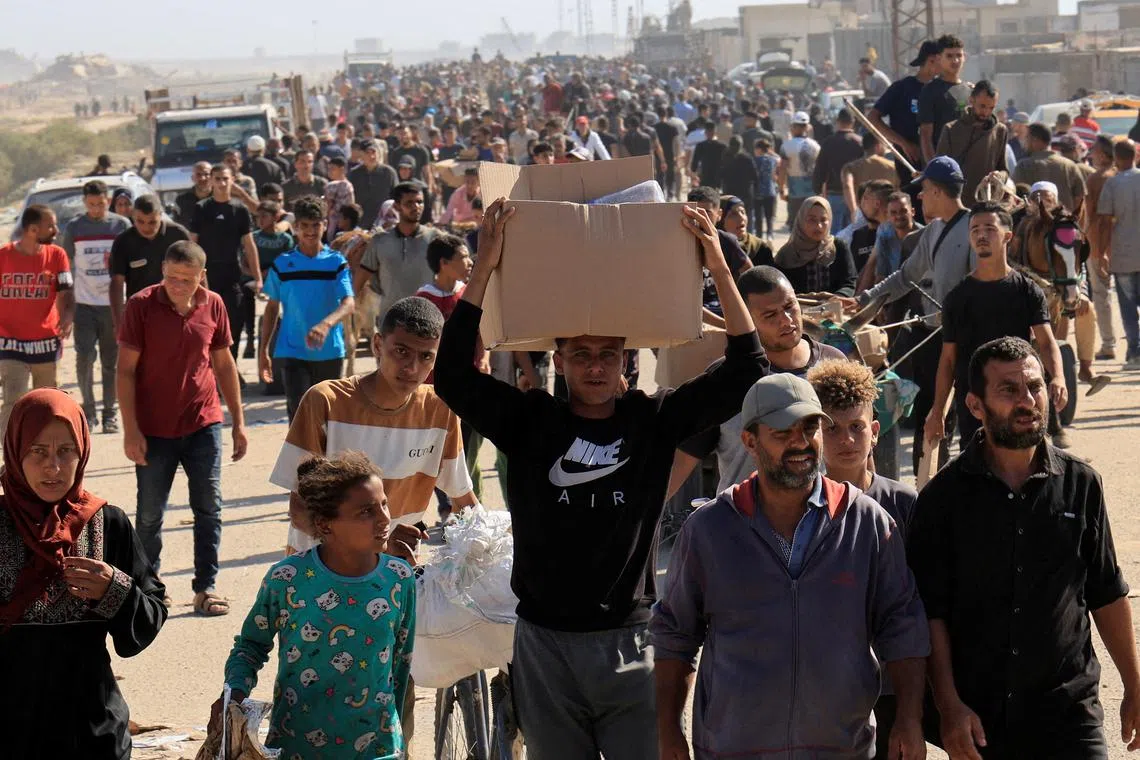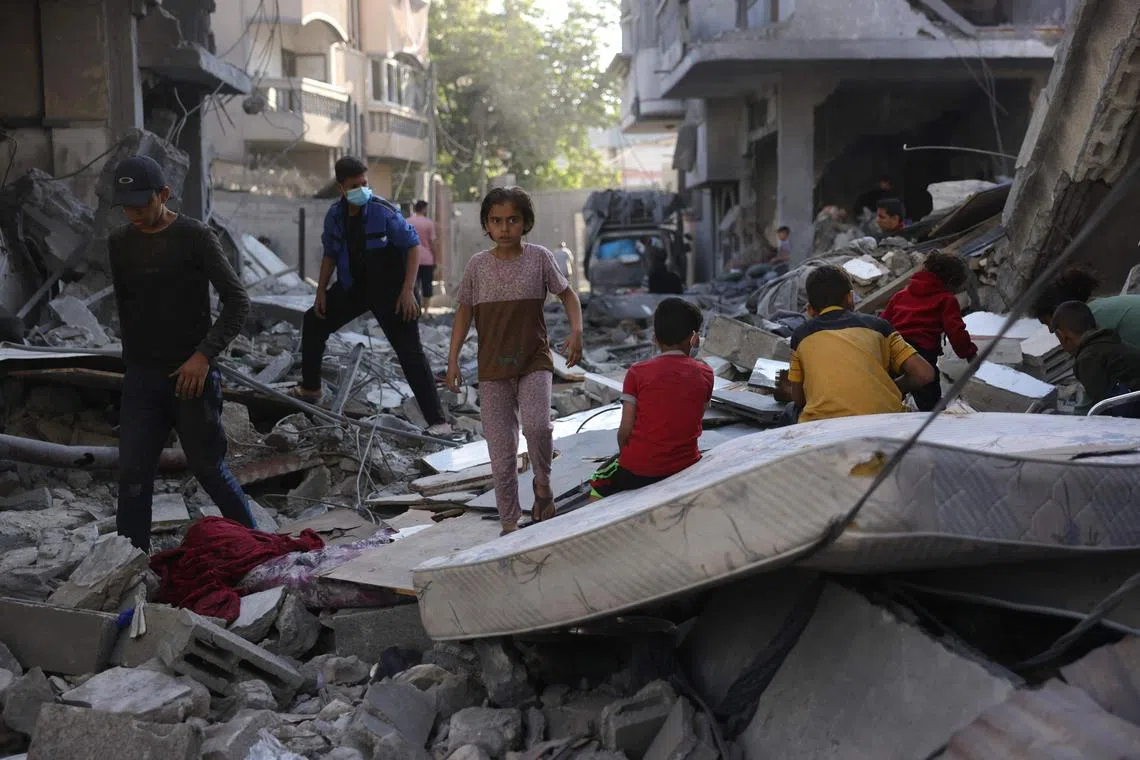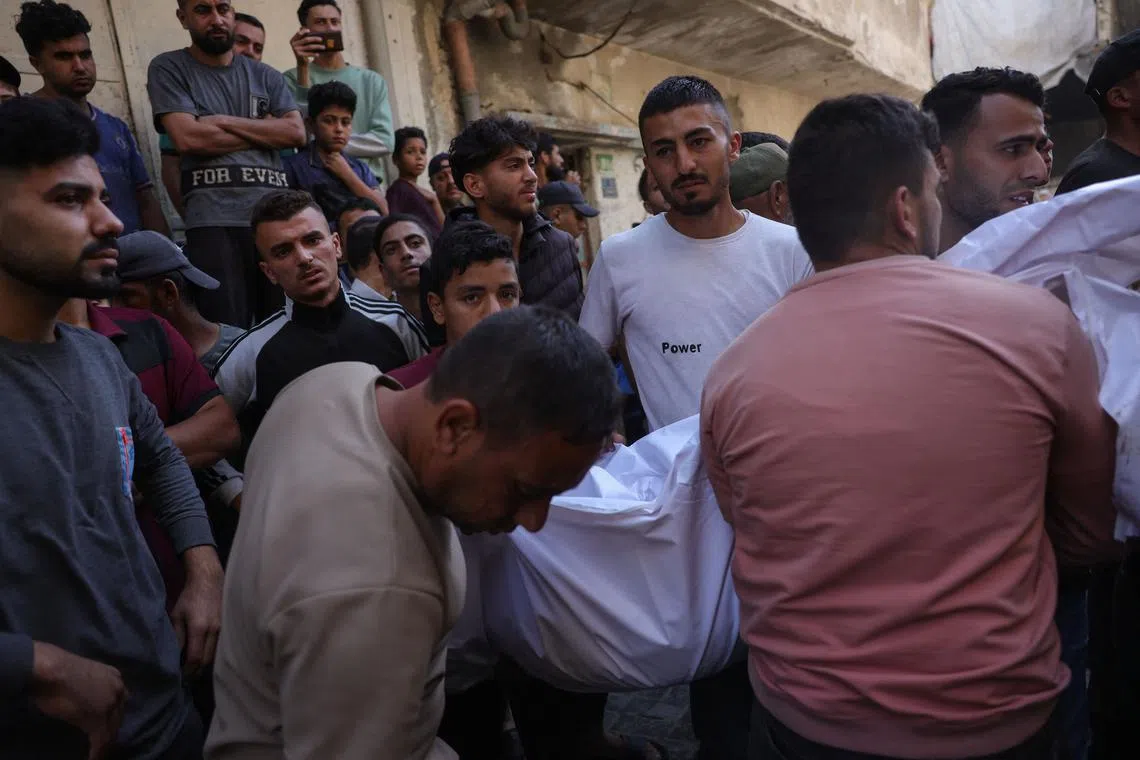Hamas says it has submitted response on Gaza ceasefire proposal as Israel threatens ‘annihilation’
Sign up now: Get ST's newsletters delivered to your inbox

Palestinians seeking aid gather near an aid distribution site in Rafah on May 27.
PHOTO: REUTERS
Follow topic:
GAZA CITY - Hamas said on May 31 that it has submitted to mediators its response to a ceasefire proposal presented by US President Donald Trump’s Middle East envoy Steve Witkoff.
The Palestinian group said in a statement that under the deal, it will release 10 living hostages and 18 bodies in return for Israel’s release of a number of Palestinian prisoners, Reuters reported.
The Israeli Prime Minister’s office did not immediately respond to a request for comment.
Israel on May 30 said Hamas must accept the hostage deal
It came amid dire conditions on the ground, with the United Nations warning that Gaza’s entire population was at risk of famine.
Israeli Defence Minister Israel Katz said Hamas must agree to a ceasefire proposal presented by Mr Witkoff or be destroyed, after the Palestinian militant group said the deal failed to satisfy its demands.
“The Hamas murderers will now be forced to choose: Accept the terms of the ‘Witkoff Deal’ for the release of the hostages – or be annihilated.”
Israel has repeatedly said that the destruction of Hamas was a key aim of the war.
Negotiations to end nearly 20 months of war in Gaza have failed to achieve a breakthrough, with Israel resuming operations in March following a short-lived truce.
In the US, Mr Trump told reporters “they’re very close to an agreement on Gaza”, adding: “We’ll let you know about it during the day or maybe tomorrow.”
Food shortages in Gaza persist, with aid only trickling in after the partial lifting by Israel of a more than two-month blockade.
Mr Jens Laerke, a spokesman for the UN humanitarian agency, called Gaza “the hungriest place on earth”.
“It’s the only defined area – a country or defined territory within a country – where you have the entire population at risk of famine.”
Later, the UN condemned the “looting of large quantities of medical equipment” and other supplies “intended for malnourished children” from one of its Gaza warehouses by armed individuals.
Aid groups have warned that desperation for food and medicine among Gazans was causing security to deteriorate.
‘Crusade’ against Israel
Israel has doubled down on its settlement expansion in the occupied West Bank, while defying calls from French President Emmanuel Macron and other world leaders for a two-state solution.
This week, Israel announced the creation of 22 new settlements in the Palestinian territory, which Israel has occupied since 1967.
London said the move was a “deliberate obstacle” to Palestinian statehood, while Egypt called it “a provocative and blatant new violation of international law and Palestinian rights”.
The 57-member Organisation of Islamic Cooperation, which includes Egypt, also condemned Israel’s decision.
On May 30, Mr Katz vowed to build a “Jewish Israeli state” in the West Bank.
Israeli settlements in the Palestinian territory are considered illegal under international law and seen as a major obstacle to a lasting peace in the decades-long Israeli-Palestinian conflict. Mr Katz framed the move as a direct rebuke to Mr Macron and others pushing for recognition of a Palestinian state.
Mr Macron on May 30 said that recognition of a Palestinian state, with some conditions, was “not only a moral duty, but a political necessity”.
Israel’s Foreign Ministry accused the French President of undertaking a “crusade against the Jewish state”.
Separately, a diplomatic source told AFP that Saudi Foreign Minister Faisal bin Farhan would make the first visit of its kind to the West Bank on June 1.
‘Children in pieces’
The White House announced on May 29 that Israel had “signed off” on a new ceasefire proposal submitted to Hamas.
The Palestinian group had said the deal failed to satisfy its demands, but stopped short of rejecting it outright, saying it was “holding consultations” on the proposal.

Palestinians checking the site of an overnight Israeli strike, in Jabalia in the central Gaza Strip, on May 30.
PHOTO: AFP
Gaza’s civil defence agency told AFP that at least 45 people had been killed
Palestinians sobbed over the bodies of their loved ones at Gaza City’s Al-Shifa Hospital following the strike, AFPTV footage showed.
“These were civilians and were sleeping at their homes,” said neighbour Mahmud al-Ghaf, describing “children in pieces”.

Palestinians carry the bodies of members of the Azzam family who were killed in Jabalia on May 29.
PHOTO: AFP
The Israeli military did not immediately respond to a request for comment, but said separately that the air force had hit “dozens of targets” across Gaza over the past day.
The Health Ministry in Hamas-run Gaza said on May 30 that at least 4,058 people had been killed since Israel resumed operations on March 18, taking the war’s overall toll to 54,321, mostly civilians.
Hamas’ 2023 attack on Israel resulted in the deaths of 1,218 people, also mostly civilians, according to an AFP tally based on official figures.
Of the 251 hostages seized during Hamas’ attack, 57 remain in Gaza, including 34 the Israeli military says are dead. AFP, REUTERS

